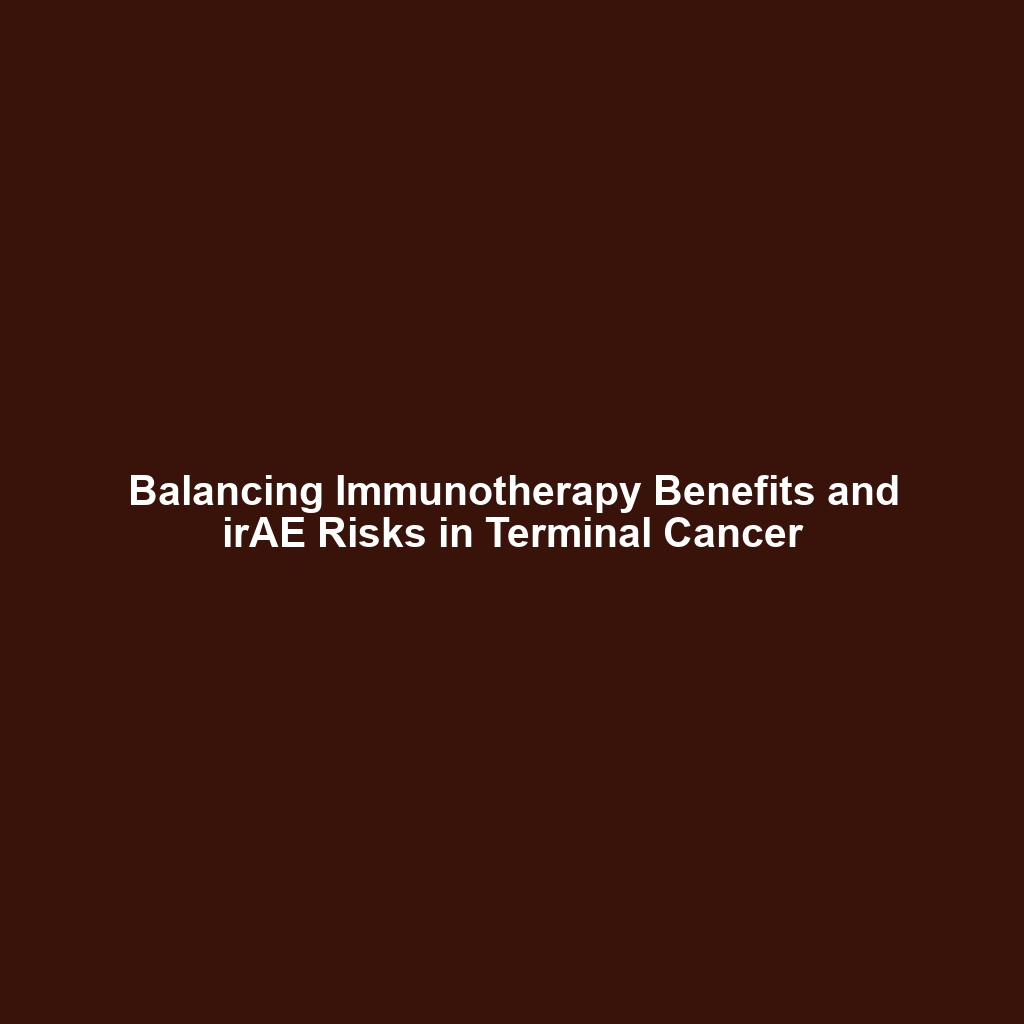Balancing the Risks of irAEs with the Benefits of Immunotherapy in Terminal Patients
Introduction
In the landscape of Immunotherapy & Cancer, the balance between the potential benefits and risks is a crucial consideration, particularly for terminal patients. As cancer treatments evolve, immunotherapy has emerged as a promising approach that harnesses the body’s immune system to combat malignancies. However, this innovative treatment comes with the risk of immune-related adverse events (irAEs), raising significant concerns for both patients and healthcare providers. Understanding how to maximize therapeutic benefits while minimizing irAEs is essential for improving patient outcomes in terminal cases.
Key Concepts
The interplay between immunotherapy and cancer treatment involves several cardinal principles:
- Immunological Mechanisms: Immunotherapy works by stimulating the immune system to recognize and attack cancer cells.
- irAEs Explained: Immune-related adverse events are unintended inflammatory responses that can occur when the immune system is activated, presenting a significant challenge in clinical management.
- Therapeutic Strategies: Balancing strategies may include adjusting dosages, using corticosteroids, and constant monitoring for symptoms of irAEs in terminal patients.
By integrating these concepts, healthcare professionals can devise treatment plans that leverage the full potential of immunotherapy while safeguarding against the adverse effects that could compromise the quality of life for terminal patients.
Applications and Real-World Uses
Understanding how balancing the risks of irAEs with the benefits of immunotherapy applies in clinical settings is vital for improving treatment protocols:
- Case Studies: Several terminal cancer patients have demonstrated positive outcomes with immunotherapy, where effective monitoring and management of irAEs played a significant role in treatment success.
- Clinical Protocols: Hospitals are increasingly adopting customized treatment plans that include rigorous evaluation of patients prior to immunotherapy initiation.
- Patient Education: Informing patients about the potential irAEs can help in timely recognition and reporting, fostering better engagement in their cancer treatment.
These applications underscore the importance of a balanced approach in enhancing cancer care through immunotherapy.
Current Challenges
Addressing the challenges of balancing the risks of irAEs with immunotherapy benefits presents several complexities:
- Varied Responses: Individual responses to immunotherapy can greatly differ, complicating the prediction of potential irAEs.
- Lack of Standardization: The absence of standardized protocols for managing irAEs can result in inconsistent patient care.
- Research Gaps: More research is needed to elucidate the mechanisms behind irAEs and their long-term impact on terminal patients.
Future Research and Innovations
Looking ahead, the prospect of future innovations in immunotherapy presents exciting possibilities:
- Next-Gen Therapies: Research aims to develop new immunotherapeutic agents that selectively enhance cancer-targeting effects while mitigating irAEs.
- Biomarker Identification: Advances in biomarker discovery could lead to more personalized treatment strategies that predict susceptibility to irAEs.
- Artificial Intelligence: AI-driven tools are being developed to assist clinicians in real-time monitoring and management of patients undergoing immunotherapy.
Conclusion
Balancing the risks of immune-related adverse events (irAEs) with the benefits of immunotherapy is a critical aspect of cancer treatment, particularly for terminal patients. Continued research and innovative strategies are essential for optimizing therapeutic approaches while minimizing risks. As the field of Immunotherapy & Cancer evolves, it is imperative for healthcare providers to remain vigilant and proactive in addressing these challenges. For further reading on immunotherapy advancements and patient care strategies, visit our related articles on immunotherapy advancements and patient care strategies.

Leave a Reply